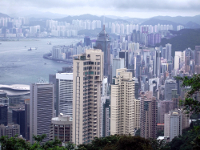The Hong Kong property market is vibrant, just like the city itself. With the Hong Kong dollar pegged to the US dollar, the property market somewhat follows US trends. At the very low current interest rates, along with very low supply, housing demand and prices are high.
It is possible for an expat to buy property in Hong Kong, but there are a number of barriers to entry. First is a factor that affects all potential buyers: the scarcity of properties available. Hong Kong is partly a small mountainous island after all, and the territory already has sections that have the densest population in the world (Mong Kok with 340,000 people/sq mile), so unoccupied land and properties are limited.The Hong Kong government owns nearly all of the land across the territory. If you purchase a housing unit in Hong Kong, you are actually entering into a lease with the Hong Kong government, now the People’s Republic of China. The lease may last through 2047 (the end of the “one country, two systems” post-British period) or somewhat earlier. You will pay an annual fee of 3% for this lease.
Hong Kong occasionally “makes” additional land using shoreline reclamation. Much of the planned building expansion of 8,000 to 10,000 units per year is for lower income or elderly housing, not available for additional units that would be open for expat purchase.
The next limiting factor, perhaps the one with the greatest impact, is the price itself. Hong Kong is third in the world (behind Monaco and London) for price per square foot of residential property. Prices vary from $800 US per square foot in New Territories and Outlying Islands to $1,300 US per square foot on Hong Kong Island, 50% higher than in New York City. So even the typical very small apartment (500 sq ft) is a half-million dollar investment. A more comfortable, but not luxurious space will be in the millions.
It’s worth looking at the “price/rent” ratio which compares total cost of ownership to rental costs. Anything over 21 is considered much better to rent than buy. Hong Kong is very high at 32! This means that you’re getting a huge bargain renting an apartment at $5,000 to $10,000 US per month as compared to buying it. With a 20% increase in residential property prices from the start of 2012 to fall 2012, residential prices have returned to the peak levels in 1997. Prices now are double what they were at the start of 2010. Most current projections indicate that appreciation will not continue at this rate; in fact, some experts predict prices will stay relatively flat through 2013. Don’t count on continued price growth when making your rent vs. buy decision.
Another restrictive factor relates to government deterrents to expat property ownership. Because of these skyrocketing property prices, the Hong Kong government made a surprise announcement in November 2012 with the immediate implementation of a 15% property tax on all home purchases by foreigners. One driver of this action was the interest in reducing the high level of possibly speculative purchases by mainland Chinese (who made 9% of residential purchases in 2012), but the change also has an impact on any expats actually planning on living in the units they purchase.
A second related deterrent measure can impact expats as well. Again, to reduce speculation and control price, the government put a sliding scale stamp tax in place. Anyone selling a property within 6 months of purchase will pay 20 percent, within 12 months 15 percent, and within 36 months 10 percent. Simply because the length of expat assignments is often uncertain, the risk of having to pay this extra amount if the assignment is cut short cannot be overlooked.
After all these barriers, if you’re still interested in purchasing a home in Hong Kong, location will have a big impact on availability and cost. December 2012 sales were 1,768 in New Territories and Outlying Islands, 931 in Kowloon, and 601 on Hong Kong Island. Average price on Hong Kong Island was 1.7 times that in New Territories.
In addition to desirability of location for work and leisure activities, location may need to be considered for your child’s school needs. If you expect your child to attend a specific English Schools Foundation facility, you will need to purchase your home in the zone for that school.
The Hong Kong government provides comprehensive guidance for buying domestic property here. The advice covers selecting a real estate agent and legal representation, interpreting area (saleable area versus gross area), verifying resale ability, and understanding stamp duties and financing.
As with any transactional process in a foreign country, and specifically Hong Kong, buying a home cannot be assumed to work the same way as in your home country. It is likely to take longer, cost more, and have significantly different considerations that you must investigate before you move forward.

